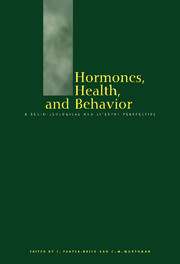Book contents
- Frontmatter
- Contents
- Contributors
- 1 Contributions of biological anthropology to the study of hormones, health, and behavior
- 2 Hormonal correlates of personality and social contexts: from non-human to human primates
- 3 Epidemiology of human development
- 4 Family environment, stress, and health during childhood
- 5 Work and hormonal variation in subsistence and industrial contexts
- 6 Reproductive ecology and reproductive cancers
- 7 Diet, hormones, and health: an evolutionary–ecological perspective
- 8 Modernization, psychosocial factors, insulin, and cardiovascular health
- Index
7 - Diet, hormones, and health: an evolutionary–ecological perspective
Published online by Cambridge University Press: 29 January 2010
- Frontmatter
- Contents
- Contributors
- 1 Contributions of biological anthropology to the study of hormones, health, and behavior
- 2 Hormonal correlates of personality and social contexts: from non-human to human primates
- 3 Epidemiology of human development
- 4 Family environment, stress, and health during childhood
- 5 Work and hormonal variation in subsistence and industrial contexts
- 6 Reproductive ecology and reproductive cancers
- 7 Diet, hormones, and health: an evolutionary–ecological perspective
- 8 Modernization, psychosocial factors, insulin, and cardiovascular health
- Index
Summary
Introduction
The old adage “you are what you eat” may be more apt than we ever could have imagined. Diet not only influences human health and development but also has shaped the evolution of our behavior and physiology. Although anthropologists traditionally have viewed culture as an intentional process obviating biological adaptation, there is good evidence that cultural practices can produce both physiological and evolutionary changes in human populations (Cohen & Armelagos, 1984; Durham, 1991). Biological responses, in turn, exert selective pressures on cultural traits (Rindos, 1989). Plant exploitation, cultivation, and consumption are good examples of these interactions. This chapter examines the influence of diet on cancer risk from an adaptive and phylogenetic perspective. It describes the growth of cancer and other chronic diseases in Western populations in relation to nutritional and other dietary constituents that directly and indirectly influence the development and function of the reproductive system. The links between diet and reproductive cancer are explained as an outcome of human reproductive strategies, adaptations of the reproductive system that coordinate reproduction with optimal nutritional conditions. Dietary practices that elevate cancer risk are related to human food preferences and underlying perceptual mechanisms that may reflect ancestral foraging strategies. These foraging and reproductive strategies are argued to be ancestral traits that humans share with other apes, reflecting our evolutionary history as frugivorous primates adapted to variable and unpredictable food resources, a heritage that molded the domestication of human crops in prehistory and that propels modern human populations toward chronic disease as our food preferences are increasingly realized.
- Type
- Chapter
- Information
- Hormones, Health and BehaviourA Socio-ecological and Lifespan Perspective, pp. 210 - 243Publisher: Cambridge University PressPrint publication year: 1998
- 1
- Cited by

